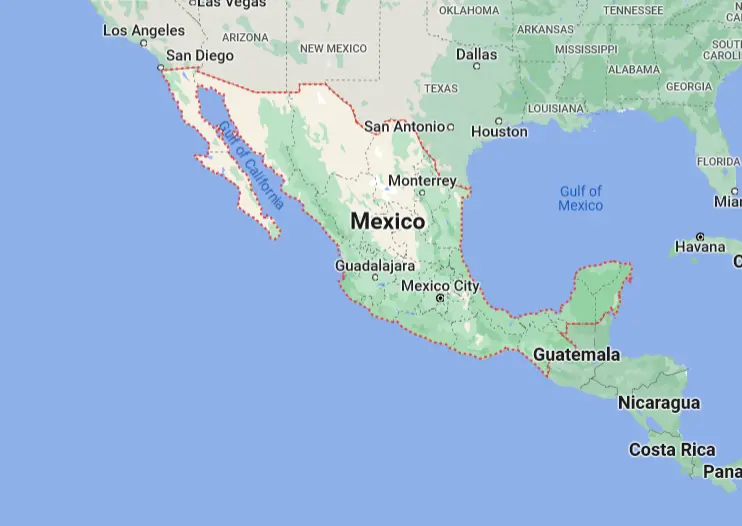
Mexico’s beautiful landscapes, vibrant culture, and affordable real estate market have made it an attractive destination for property investment, particularly for US citizens seeking a second home or a retirement haven. However, before diving into the Puerto Vallarta or Mexican real estate market in general, it’s essential to understand the regulations and processes involved. In this article, we’ll explore the topic of buying property in Mexico as a US citizen and shed light on the opportunities and considerations for potential investors.
One of the primary concerns for US citizens interested in purchasing property in Mexico is the country’s restricted zone, also known as the “Prohibited Zone.” According to the Mexican Constitution, the restricted zone refers to the area within 100 kilometers (about 62 miles) from Mexico’s borders and 50 kilometers (about 31 miles) from its coastline. Historically, this zone was created to protect Mexico’s national interests and preserve its resources.

Trust Arrangement for Property Ownership: While foreigners are restricted from directly owning property within the restricted zone, Mexico offers a legal mechanism called the “Fideicomiso” to allow non-Mexican citizens to acquire and hold residential property within this area. Under the Fideicomiso system, a Mexican bank acts as the trustee, holding the property title on behalf of the foreign buyer. The buyer becomes the beneficiary of the trust, with the right to use, sell, or lease the property.
The Fideicomiso provides strong legal protection to foreign buyers, and the trust agreement is valid for 50 years and can be renewed indefinitely. The trust can be transferred to another foreign buyer, and inheritance laws are also well-established, ensuring the seamless transfer of property to heirs.
Alternative Options: In addition to the Fideicomiso, there are alternative ownership options available to US citizens in certain specific cases. For example, if the property is located in a free-trade zone or falls under certain exemptions, such as properties for industrial, touristic, or commercial purposes, foreign ownership may be allowed without the need for a trust.

Navigating the Mexican real estate market can be complex, and it is advisable to seek legal advice from a qualified Mexican attorney who specializes in real estate transactions. The attorney will ensure that all necessary paperwork, including title searches, permits, and contracts, are in order and that the transaction is conducted in compliance with Mexican laws and regulations. Engaging a reputable real estate agent who has experience working with foreign buyers can also provide valuable guidance throughout the process.
US citizens interested in purchasing property in Mexico have several financing options available to them. While it may be possible to secure a mortgage from a Mexican bank, it can be challenging due to the stringent lending criteria and higher interest rates for foreigners. Another alternative is obtaining financing from a US-based lender or using home equity loans or lines of credit against US properties.

Working with a Property Management Company: Once you’ve successfully acquired property in Mexico, you may consider renting it out as a vacation home or for long-term tenants. This is where professional property management services can be invaluable. Naya Homes, a property management company based in Puerto Vallarta, specializes in assisting property owners with their rentals and ensuring a seamless and profitable experience.
Naya Homes is a property management company that offers comprehensive services, including property marketing, tenant screening, rent collection, maintenance coordination, and property inspections. With their local expertise and dedication to client satisfaction, Naya Homes can alleviate the challenges of property management, allowing owners to enjoy their investment while maximizing returns.
Also read:

Have you ever wondered how long a US citizen can stay in Mexico? As a property management company in Puerto Vallarta, Naya Homes frequently fields questions from potential investors about…
To pay for a fideicomiso (a trust used for foreign ownership of Mexican real estate), you typically make payments directly to the bank or financial institution that manages the trust.
The annual property tax in Mexico, known as “predial,” varies depending on the location and value of the property. It is typically a small percentage of the property’s assessed value.
Property taxes in Mexico can vary from state to state and are typically lower compared to many other countries. The rates are determined based on the assessed value of the property and can range from 0.1% to 1% or more.
In Mexico, the buyer is usually responsible for paying the closing costs, which can include fees for legal services, title search, notary services, and other administrative expenses.
If you are a US citizen or resident living in Mexico, you may still be required to pay US taxes on your worldwide income. The United States taxes its citizens and residents based on their worldwide income, regardless of where they live. However, there are tax treaties and provisions that may help you avoid double taxation or provide certain exemptions. It is advisable to consult with a tax professional or seek advice from the IRS for specific details related to your situation.

Fill out the form to set up an appointment with one of our property management experts.
